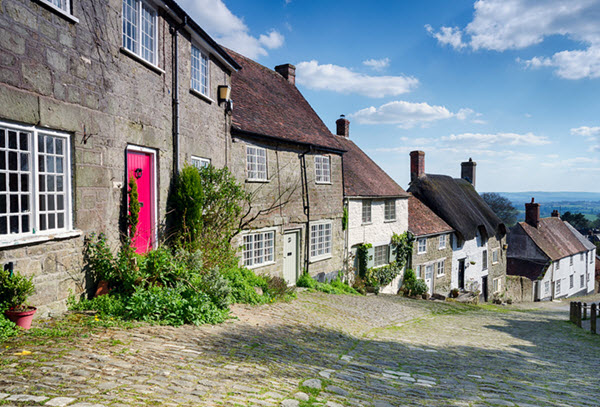Best places to live in 2017? From Louisville to London, from Palo Alto to Paris, from San Antonio to Santa Cruz, the answer is: That depends.
 Why do I say that depends? Because it’s a matter of what you care about and what you want. It’s a matter of where you stand (or sit) in Maslow’s Hierarchy of Needs.
Why do I say that depends? Because it’s a matter of what you care about and what you want. It’s a matter of where you stand (or sit) in Maslow’s Hierarchy of Needs.
It’s a matter of money. Of health. Of politics.
What you want and what you care about?
We carry our values and our dreams with us everywhere, don’t we? Aren’t they our lifelong companions, even as they evolve? Don’t they shape every decision, especially the most important ones?
And let’s not forget these factors: age / stage, family situation, education, and skills; temperament, attitude, and character. Each of these aspects of who you are and where you are in life enable you to capitalize on opportunities, to feel at ease in certain cities or regions, as well as to adapt to new places more readily. Or not!
Looking for a New Place to Build a Life
This is the time of year when we may connect more fully to our dreams — dreams of a new destination where we can pursue our lives in enjoyable or productive ways. And in those dreams, we imagine that a different location may provide more options for achieving our desires.
Yet just as I might say there is no “one” right partner for us for life, I would say that there is no single “right” destination for a lifetime, at least not for most of us.
As for tools and resources to guide your process of choosing a place to live, they typically include websites, directories, travel sites… Whether or not your dream location actually resides on one of these lists, you are sure to gain new insights into locations to explore as possibilities. And of course, essential to a better understanding of what life is truly like anywhere are people: friends, colleagues, individuals we encounter here and there whose word we trust, and whose personal experience strikes a chord, persuades or dissuades, or sparks an idea.
While some may say that it doesn’t matter where you live, but rather with whom you live, I suggest that approach only goes so far in the “real” world where less romanticized considerations guide our daily lives — in particular, money.
 Now, several of the major media “best places to live” lists usually appear in March. This annual activity is one I like to follow and expand on, typically at the end of one year or the beginning of the next. This is when many of us are assessing the 12 months we’ve just raced (or muddled) through, and we’re looking forward to more of the same or making some changes.
Now, several of the major media “best places to live” lists usually appear in March. This annual activity is one I like to follow and expand on, typically at the end of one year or the beginning of the next. This is when many of us are assessing the 12 months we’ve just raced (or muddled) through, and we’re looking forward to more of the same or making some changes.
What Factors Into “Best Place” Rankings?
Various elements factor into official rankings of cities — in the U.S. Media sources like U.S. News and Business Insider generally rely on their own surveys along with U.S. census data, data from the Bureau of Labor Statistics, and other public sources.
Primary factors in the major listings of best places to live?
Try these: cost of living, job market, and what is generally referred to as “quality of life.”
This last item touches on:
- climate / weather
- housing style / housing access
- urban / suburban / small town / rural preferences
- cultural and recreational activities
- transportation (public vs. roads and commutes)
- medical / healthcare facilities and services
- school systems
No doubt, you could come up with a few more items you might add to this list — including dmographics that are important to you. And, returning to the issues of age, stage, and family status, you can easily see how the relative priority of some of these items would shift depending upon your circumstances. And that brings me to the next critical issue.
What Is Your Objective?
 Naturally, your next “best place to live” is a matter of what you’re seeking. Are you looking for more job opportunities or more suitable ones? Are you hoping for housing that is more compatible with evolving needs such as a growing family, or downsizing after empty nest? Are you looking to be more comfortable in your life — for example, saying adios to shoveling your way to your car before your commute?
Naturally, your next “best place to live” is a matter of what you’re seeking. Are you looking for more job opportunities or more suitable ones? Are you hoping for housing that is more compatible with evolving needs such as a growing family, or downsizing after empty nest? Are you looking to be more comfortable in your life — for example, saying adios to shoveling your way to your car before your commute?
As you clarify your objectives, among the many questions you may be asking yourself are these.
- If you still need to earn a living, where is the optimal geographic market for the job / career you seek to pursue?
- Are you looking for a romantic partner? Do the demographics of the region you are considering match your target?
- Do you have medical / mental health / health maintenance needs that are better served in certain locations — including access of various types if disabled? (Transportation, housing, support services)
- Looking for educational opportunities that are more available in certain regions?
- Do you have kids to send to public school? Aging parents that need housing?
And if you’re having trouble with this step, try this: “I want to start over in a new place because ___________” and then fill in the blank. Once you’re clear on your primary objectives, prioritize them! And do remember that cultural and political “fit” can be significant determinants in whether or not you will be at ease in your home.
Considering Relocation? Start Here.
Whether you’re looking for a place to live for the next three years or 30, there are plenty of sites on the web to jump start your research. But don’t forget to talk to current or former residents — who have something in common with you. Use friends, family, and online contacts to find out more about the locales you are considering. Cruise high school and college alumni listings to find a connection in the area, make contact, and get the scoop. Maybe you have the freedom to visit or house sit. Maybe you can take an impromptu virtual tour with an online acquaintance via Skype or Face Time.
As for resources, sites like BestPlaces.net offer data such as housing costs, too easily overlooked when we dream of a new place to live. Among the features I find most useful — the ability to compare cities under consideration, or somewhere you currently reside to a location on your “possibles” list.
I like the approach of this Business Insider best places to live list. It incorporates cost of living from the get-go, highlighting cities with a high livability index that require an income of roughly $40,000 a year. Incidentally, that income level is below the median household income in the U.S.
Business Insider’s list is also nicely organized, and whether or not you agree with or are tempted by their picks, creating your own short list in similar fashion is a good idea. But do look in more detail at housing, likewise items we often forget like taxes and transportation costs. And, I would suggest you drill down into the details of your highest priority livability factors — from mountain hiking trails to symphony to cafés for people watching.
Best Place for YOU?
 Zeroing in on a place to live that suits you is not so different from finding a mate; needs change as circumstances change, and reality requires compromise. For example, the idyllic “small, friendly, walkable community with coffee shops and bookstores, but no harsh winters” is what so many of us describe as desirable. Unfortunately, it may come with a higher price tag for housing, schools that don’t suit, or a political climate you don’t care for. Then what?
Zeroing in on a place to live that suits you is not so different from finding a mate; needs change as circumstances change, and reality requires compromise. For example, the idyllic “small, friendly, walkable community with coffee shops and bookstores, but no harsh winters” is what so many of us describe as desirable. Unfortunately, it may come with a higher price tag for housing, schools that don’t suit, or a political climate you don’t care for. Then what?
Or… Perhaps you adore the politics, housing is affordable, but the demographics are too young and infrastructure is lacking — infrastructure typically includes local services, roads, buses, airports, and possibly, access to hospitals or other medical service providers. You may have to ask yourself if the population drawbacks and infrastructure deficits are more or less a problem given your family situation, your age, your health, your work, and so on.
This is why identifying priorities — and constraints — is vital to your decision process.
A Variety of Helpful “Best Places” Lists
So how are these lists created?
Livability provides insight into ranking methodology here, describing the survey sample size, population figures for the pool of cities considered, factors included in their surveys, and so on.
Now, let’s look at a number of media resources based on 2016 data.
Among the cities on the Business Insider list, which dates to October 2016, you will find:
- Houston, Texas
- Cleveland, Ohio
- Bristol, Tennessee
- Rochester, New York.
Livability’s Top 100 Best Places to Live focuses on small to medium size cities, listing their top three as:
- Rochester, Minnesota
- Bellevue, Washington
- Madison, Wisconsin.
Among the reasons these spots take the top honors are: quality of schools; thriving local economies; quality of healthcare facilities; and livability factors such as restaurants, music festivals, walking and biking trails, and more.
Also in their top 20 are cities as varied as:
- Palo Alto, California
- Bismarck, North Dakota
- San Mateo, California
- Santa Cruz, California
- Fort Collins, Colorado
- Overland Park, Kansas.
Knowing how easy it is to interpret data to serve our goals, not to mention the variability of personal preference, let’s take what we read with a grain (or kilo) of salt. Specifically, let’s consider housing.
By way of example, note that some 2014 best places to live lists — Livability’s in fact — placed Palo Alto at the top, where the cost of housing is off the charts for most of us. As this savvy reader notes, the average cost of a 2-bedroom home in Palo Alto is big bucks… VERY big bucks, running $1.8 million on the low end to well over $2.3 million, depending on the neighborhood.* Rentals? Sky high to those of us who don’t live in California or New York!
Money, Health, Healthy Places to Live
Another list I like is this, published in Fall 2016, from Time Money: The Healthiest Places to Live in the US. It is likely no surprise that a healthy lifestyle is uppermost in the minds of those who can afford to worry about it, and being able to afford a healthy environment — one with clean air, water, access to quality food, plentiful exercise opportunities — can make an enormous difference in quality of life.
Among the criteria used in their data gathering is (self-reported) “feeling” healthy, along with access to good doctors and hospitals.
Locations on the “healthy places” list include:
- St. Augustine, Florida
- Provo, Utah
- Cheyenne, Wyoming
- Greenwich, Connecticut.
Of course, what feels healthy to me may be less so to you. For instance, if I am big into winter sports, then certain regions afford me precisely the outdoor activities that I most enjoy. On the other hand, if my taste tends toward warm weather sports, I’m not so likely to find Utah or Wyoming to be my cup of tea.
“Best Place” Realities
Relocation is a necessity for some — when seeking work or moving to care for a family member. Relocation may also be viewed as a privilege that is unavailable to millions of people without the logistical or financial means to consider — and risk — trying out a new place to live.
A note on risk… when there is little to no financial cushion to fall back on (to recoup losses if your move doesn’t deliver the desired outcome), this too becomes a serious consideration. (This is often the case when looking to start over in middle age or older. A backup plan is advisable.)
Cost of living is, for most of us, one of the most important elements in choosing a new place to live, and includes a broad set of expenses to take into account. We typically think of food and shelter, but should also factor in:
- utilities
- property taxes (if purchasing a home)
- (state) income taxes
- transportation / gas prices
- car insurance (rates vary significantly depending on where you live)
And much in the news in the U.S., but all too uncertain these days — cost of healthcare, which can vary significantly by state, can become a “make or break” line item for many of us.
Cost of Living Estimate Assistance
Now, where cost of living is higher, salaries and pay rates are often higher as well. So do be sure to use sites like salary.com if you’re seeking work, to get a feel for the income you could make in a target region.
For help with cost of living estimates, realtor.com and zillow.com are among several sites that will facilitate your search for a home and can aid in understanding related expenses. These sites are simple to use, show what’s on the market, and also offer ratings of local schools.
If you’re looking to rent — a good idea when trying out a new location — numerous sites exist to help including apartments.com and rent.com. One of the features I like about rent.com is its overview by state. For example, if you’re considering Massachusetts but you’ve never actually lived there, just specify “Massachusetts” in your URL and read area highlights, rental price range, then easily navigate to all the towns where home, condo, and apartment rentals are available.
When looking at cost-of-living estimates, be realistic about your specific needs and those of your family. If you’re planning on staying in your new destination for some time, planning for the near and intermediate future is advised.
For those hoping to estimate U.S. state-specific health insurance costs, or at least find a starting point for their research, Healthcare.gov may be of some assistance. However, the length of time and extent to which this is true remains up in the air in the current political environment.
Other Best Places Angles: Retirement, Overseas Living
Forbes offers their top 25 best places to retire, pointing out in their 2016 listing that the 55+ crowd tends to seek sunnier and more moderate climes, with Abilene, Texas, Athens, Georgia, and Blacksburg, Virginia high on the list.
Forbes also addresses the importance of these factors in their selections:
- cost of living (though their index does extend above national average)
- income tax (nine states have no state income tax) and tax handling of pensions / social security
- quality healthcare
- physical security, ie crime statistics
- walkability
If you’re in a position to move overseas, particularly if looking to retire, Huff Post’s best international cities list offers locations in Portugal, Belize, Colombia, and France among others. Their compilation is roughly a year old, and while it focuses on cost of living as well as quality-of-life, I wonder what the past year’s turmoil — and the fact that it continues — might do to prior years’ recommendations and rankings.
When considering an overseas relocation, do remember that language, politics, and local culture are critical issues. Do not underestimate the potential enormity of acclimating to a new country, but do not underestimate the pleasure and satisfaction of such an adventure either!
How Do These Lists Change Year to Year?
You are likely to see some of the same cities and towns appear on multiple “best places to live” lists over the course of several years. To me, this underscores the fact that survey data reflects factors that typically make locations desirable. That said, generally speaking, these rankings do not delve many levels deep into the data that may be most important to you. For instance, if you’re hoping to date, you should search for specific discussions that take more detailed demographics into account — age, sex, sexual orientation, ethnicity, religion, income, education. And I’ve yet to see any listings other than my own that address political orientation, which is more of a factor then we may realize — from reproductive righs to voting rights to bathroom bills.
Seek out targeted references where they exist, e.g. best places to live if you are single, best places to live for single parents, best places to live over age 50, and so on.
 A few years back, a reader asked for more detailed information for those who are disabled and looking to relocate. I did not pursue the nature of her disability, but as I grow older, I begin to understand the many variations of additional support that some environments provide and others do not — with challenges ranging from mobility to impaired vision.
A few years back, a reader asked for more detailed information for those who are disabled and looking to relocate. I did not pursue the nature of her disability, but as I grow older, I begin to understand the many variations of additional support that some environments provide and others do not — with challenges ranging from mobility to impaired vision.
This is not merely a matter of access to assisted-living of different types. Nor is it simply about access to healthcare. It has to do with types of housing, sidewalks, proximity of stores and accessible transportation, whether or not supermarkets, pharmacies or other merchandise providers can or will deliver, and to a certain degree even the locations of businesses where one might be employed or find clients and/or customers.
As a simple example, I work remotely from a home office, and I have periodic difficulty with stairs due to back pain. As I move along in middle age, one-story living is ideal, one flight of stairs is manageable, but a three-story townhouse in which I’m required to go up and down steps all day due to layout is a problem.
Consequently, my “best place to live” should offer affordable rentals that do not include Hitchcock’s 39 steps!
Don’t Shelve Your Dreams
On a personal note, I would like to say that I do not regret the dozen times I relocated in my twenties and thirties. Nor do I regret the travel adventures undertaken even younger. It was always a dream to live abroad, and I did exactly that before marriage, children, and the inevitable complexities of growing older.
If you have the ability to experience your dream destinations — for three months or three years, or whatever timeframe you can — and you can try it out while still young and strong (and less in need of infrastructure much less money) — do it. Find a way! Unless you have money and yes, your health, it is far more challenging to do so when you’re older.
I am not advising against greeting the world with an adventurous spirit at any age. However, I am acknowledging that based on your circumstances — pragmatism, preparation, and contingency planning are a must.
*Palo Alto sources: article, CNBC; Zillow.
For additional articles and posts on relocation and starting over, be sure to browse here.
You May Also Enjoy



Bellevue WA? Seriously? It’s a new, sterile, high rise, expensive downtown and cul de sac neighborhood city without the charm and history of across the lake Seattle, with a more conservative political environment and poor bus service and the need to drive everywhere. However, a Nepali friend of mine who is an MD moved her family there from Chicago specifically due to the extensive East Indian community that, for some reason, is growing there.Schools are good too. So for parents, school choice is key. But for my friend (as for myself) what will provide interaction and community is as important.
My DH and I are planning a big move in the next 2 years. We’re going to a small seaside town about 2 1/2 hours (including a ferry ride) away from our city. My daughter will remain in the city. My mother who is still in her own home, will be moving to assisted living and I have finally convinced her to move to our little town with us so that I can be 5 min away not 2 1/2 hours. So we will be moving 2 housholds, moving my daughter into an apartment, selling 2 homes, buying a new home and moving mom into assisted living. Whew.
We are lucky in that we have tried out this town twice before, and made friends quickly and easily. The scenery is beautiful and we might just be lucky enough to afford a sunrise view. It is an artist’s haven, with cultural events (the century old theater shows MET simulcasts and foreign films), a live theater company, a community orchestra that we can join, and work for me part time. There is also a co op and a farmer’s market that is the social event of the week. All of these factors went into our decision to leave our city for a gentler and kinder lifestyle. The one huge drawback is the lack of cultural diversity. The other is that when I return to the city, perhaps for part time work, I’ll have to crash on my daughter’s floor. But past experience has proven that as time goes by, I will travel to the city less and less.
Choosing where to live I think depends on where you are in your life and what is most important to you at that given point. But community, culture, food choices, beauty and ease of getting around have always been at the top of my list.
So glad you joined this conversation, Lunaboogie. This is exactly why we need real people who have lived in these cities and towns to add their two cents. It’s one thing to look at survey and census data, and quite another to have the real world experience of a community and its surroundings.
The issues you raise like bus service, political slant, and even “style” are all very important to those of us who hope to put down roots and stay for a while.
Those key trade-offs that you mention, like cultural diversity for “kinder and gentler” lifestyle, are what many of us are working to come to grips with. These challenging choices.
Other places you have lived and liked, or disliked, and why? All thoughts are welcome.
What I found as I searched was little by little non essentials in my life fell away. Simplicity is best. As Lunaboogie said: scenery, transportation, culture, farmers market etc… fills her needs and wants.
Good luck Lunaboogie!
So lunaboogie, where is this beautiful place you describe so wonderfully? It sounds like it fits with what I’m looking for. Please do tell. I’m looking for a place to move and soon. I also need to find work too. I’m in search of a simple, yet meaningful life.
I appreciate this article because it’s hard to create something like this where everyone will agree. You’ve got some great places for me and other folks to start our research. I love reading your blog. Keep up the good work.
Relocating for any person is determined primarily by their individual circumstances, so it is difficult to create a catch all list of priorities. However as relates to 50 and older, I would suggest that this is the age when time really starts to fly by, so procrastinating will be detrimental to bringing it to fruition if you are truly unhappy with your current location and circumstances.
There is so much to consider that trying to cover everything is virtually impossible. However for seniors, I would like to make one suggestion. You should do what will be best for YOU! Don’t try to please your children, relatives, friends, etc. rather, please yourself! Most of us have one passion that we like to indulge in which makes us happy, keeps us busy, and possibly healthy (Both physically and mentally) and fit, and is instrumental in providing us with the quality of life that we seek for our remaining days. And of course, that passion is usually one that your particular circumstances allow you to pursue. If you have children, close proximity to one or all of them is a big plus but not absolutely necessary, AND…I would suggest, they can come to visit you as well as you visiting them. It is a two way street!
So, if you have worked hard and raised and educated a family and they are on their own and doing well, it is time to “Pay yourself.” If you can pursue your passion, everything else will just fall into place.
Just my 2 Cents! Good luck to all.
MY DEAR NEIGHBORS are planning a MOVE! I will forward this as soon as I finish here………….
YOUR TIMING IS SPOT ON!
THANK YOU THANK YOU……………XO
This article got me dreaming above all things! 🙂 I’m just wrapping up an interview with an entrepreneur who lives on a yacht and works on board, a modern nomad. So beautiful. I also realise that many people would like to live where I’m living now but I am done with Berlin. The ecology fights my every effort of living healthy, forcing me to double said efforts. No bueno as a lifestyle!
Dreaming is always good, now. One of the useful things about this process, which I try to do every two years, is that it gets me looking into places I might not otherwise have thought of. You, too, it sounds like. I will be fascinated to hear what’s next for you, as you figure out where you might venture to after Berlin.
Always happy when you stop by. xo
And I would love to stop by more often though!
*types appointment into iphone*
I have found the website http://www.city-data.com to be very useful in getting insight on a new state/city. You can ask the locals their thoughts. People are really good on feedback (sure, negative too at times) and I often weigh my decisions based on that research. I have even joined local meetups in the city I am considering to get a vibe of the place and even ask them as well. Still, you need to go and visit and spend a little time first in the new location otherwise you are caught off-guard as I was when I moved to texas for work some years back (since left). No one has mentioned Boise, ID yet – I was curious about that. Perhaps because it is a bit isolated?
I would not live in any of those places for … of course very subjective reasons:
Either I’ve spent time there or climate etc… as we all can see it’s highly personal.
Over the course of my makeover I become involved in the boating industry. I have a new direction based on the fact that I am 60 (I can’t change that!) and I must work (maybe that could change?) and I love the heat and water – is it my Destiny calling?
My problem as an east coast urbanite: I love NY (my hometown) and live near Philly (won’t miss her) and I want to move to FL but am will I find ‘culture’ there? I think I will because there are so many other east coasters down there.
If you are not sure where to go do your best to take mini trips. I lived in New Orleans for a year and tried on L.A. for 3 mos via Airbnb rental and know for sure – No Way! I lived there as a F/A many flights over the moon ago.
So now my question is: Naples, Vero Beach or go nuts and try Islamorada. Money is a concern but over the course of trying on other cities I have completely downsized. I could actually live on a boat and be content.
Moving and changing lifestyles takes an effort to really know thyself: what do you need to feel fulfilled and content (not happy)
I also plan to ride a motorcycle and I think I will do just fine in Florida. tbd…
Good luck to all! Cheers! P
Pia Louise,
How is your search going? Are you still considering the Naples area?
Julia
Pia Louise,
Where did you end up going? I am living in PA right now and at months end packing my car and taking a road trip. stopping in various states with Florida being my final destination to relocate. Any advice would be be so appreciated!
Tacy